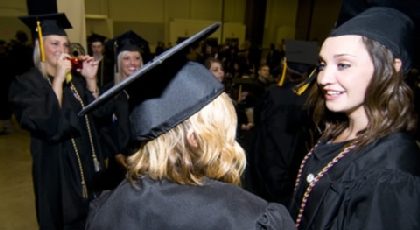Page 120 • (1,514 results in 0.081 seconds)
-

and who make a profound difference in the lives of others as a role model, confidant, critic, or co-learner. This year we honor Dr. Jason Skipper, Associate Professor of English. One colleague wrote, “From a first year writing course to the capstone, Jason mentors the room and crafts a supportive environment where people can take chances, be vulnerable, and be open-minded…. In doing this careful and labor-intensive work, Jason is mentoring these students into new lives as scholar-citizens. Jason’s
-
Seattle-based Open Books: A Poem Emporium just as she finished the Master of Fine Arts program at Pacific Lutheran University. The Rainier Writing Workshop — a three-year, low-residency program — provided Swift an outlet to pursue a graduate degree in creative writing. Open Books provided an outlet to continue to foster the community she built within the program. “The driving force was just that I wanted a poetry bookstore to exist,” Swift said. “But knowing I would be able to stay connected to the
-
biochemical techniques. Prerequisite: CHEM 403. (3) CHEM 410 : Introduction to Research An introduction to laboratory research techniques, use of the chemical literature, including computerized literature searching, research proposal, and report writing. Students develop an independent chemical research problem chosen in consultation with a member of the chemistry faculty. Students attend seminars as part of the course requirement. (2) CHEM 420 : Instrumental Analysis Theory and practice of instrumental
-
frame. Lining the frame with the LEDs should also give better light coverage to the writing on the board.Original Plans Front view of the lightboard. The board is clear Plexiglass acrylic sheeting. The standard size is 36”x72”, but can be cut down, especially if there is a local plastic company you can purchase from. The glass should be at least .22 inches thick, to cut down on the amount of vibration that moves the glass when it’s written on. The frame is regular 2”x4” lumber; kiln-dried is
-

everything that I ever thought four years could be: exciting, challenging, sad, joyous, and about every other range of emotion. What’s next? Next year I will be heading off to Luther Seminary in St. Paul, Minn., to earn a Masters of Divinity. Joe Natwick ’11 – Bachelor of Arts in religion and classics. Joshua Hammerling – Bachelor of Arts in German (languages and literatures) and English (writing emphasis) Joshua Hammerling ’11 – Bachelor of Arts in German (languages and literatures) and English (writing
-
it to music, just to see how it felt. He ended up writing three scenes, and with the help of some PLU singers and software simulating an entire orchestra, they got to hear some of their work. “She was very intrigued with the music,” Youtz said. They decided to stop in the face of uncertainty. “Why would you write an entire opera if you don’t have a performance in mind?” Youtz pointed out. “That would be a lot of work, and maybe for nothing.” But then James Brown, chair of vocal studies and
-
writing in. It just wore thin,” Nikki said. “Wore real thin.” Once she graduated, she felt she could spread her wings. She was able to spend more time in all-queer groups and learn about intracommunity and intersectional issues. And she learned, eventually, to negotiate the aspects of her identity that people had treated as contradictory (her faith and her queerness), as well as the art of honoring all her identities at once. I found my time at PLU to be at the same time supportive, combative, hurtful
-

covering the Open. The event had a similar workflow and amount of content to be written. I focused primarily on the fan experience, writing items of varying lengths about the sights and sounds around Chambers Bay. It was really exciting to be part of an internationally renowned event here in Pierce County’s backyard. The energy level was high and I was honored to be a member of such a rock star coverage team that spent several years preparing for the championship. Can you explain how your work at The
-
is a journal production editor for an academic publisher based in Maryland. She graduated from McDaniel College with a BA in English and a minor in writing. A longtime Janeite, she analyzed Persuasion through a Freudian lens for her senior thesis and later published it for the Jane Austen Society of North America. She has also presented at the Jungian Working Group’s James Joyce conference in Baltimore and writes regularly about historical film and television for Willow and Thatch. She is deeply
-
. We drew inspiration from Lang’s Small Teaching philosophy in order to create learning moments that can transform and reshape how students learn and how instructors engage with IL concepts. While our aim was to primarily provide support to writing-intensive courses, such as WRIT 101, FYEP 190, and Capstones, these resources will also be useful when applied to any research-based assignments, as well as courses that focus on critical analysis or inquiry. Before you dive deeper into this guide to
Do you have any feedback for us? If so, feel free to use our Feedback Form.


